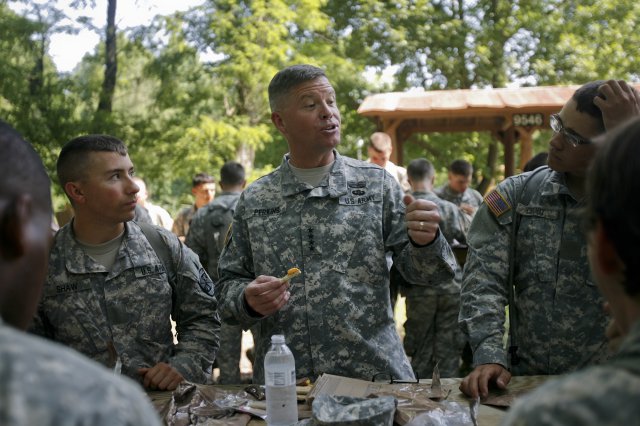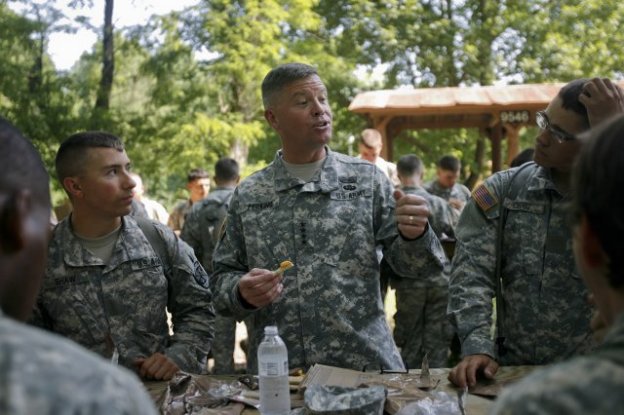
Photo Credit: Harrison Hill, USACC Public Affairs Office
Gen. David Perkins, TRADOC CG, ate lunch and talked with ROTC cadets attending the Leader Development and Assessment Course (LDAC) during his July 22 visit to Fort Knox, Kentucky.
FORT KNOX, Ky. (July 22, 2014) — Gen. David Perkins is quite the decorated officer. A 1980 graduate of the United States Military Academy at West Point, the New Hampshire native has dedicated 34 years of his life to his country. He earned the Silver Star — the nation’s third highest award for valor — after serving as the Brigade Commander for the 2nd Brigade, 3rd Infantry Division during the invasion of Iraq and commanding the unit’s “Thunder Run” into Baghdad. In March of this year, he assumed duties as Commander, United States Army Training and Doctrine Command (TRADOC).
He oversees all of the doctrine the Army publishes, and has a hand in every aspect of training.
He spent July 22 in the field with cadets, touring training sites like the rappel tower, machine gun familiarization course and cultural awareness. At the culmination of his visit, Perkins spoke for an hour with Army ROTC cadets in the 9th and 13th Regiments of the Leader Development and Assessment Course (LDAC).
The presentation served more as a motivational talk than a speech. Cadets listened with rapt attention as Perkins talked about leadership and the concept of “Mission Command.”
As he spoke about Mission Command, he stressed the importance of “exploiting the initiative.” He also stressed that effective leaders will “drive the operational process, build teams, and inform and influence people.”
“TRADOC is the general contractor and builder of the Army,” Perkins said. “Cadets, you all, are the raw material. You’re in the initial phase. You’re the 2-by-4s and plywood.”
Cadets in the front row scribbled furiously in their notebooks, writing down as much of what the general said as possible. Heads swiveled throughout the auditorium as Perkins paced back and forth.
“All things in life are relative,” Perkins said. “And the reason we put that word ‘relative’ in there is that it comes to grips with the fact that the future is always changing. So what could be a position of advantage today could be a position of disadvantage tomorrow.”
The general shared anecdotes and metaphors, continually referencing the symbolic rucksack that each cadet carried and the huge rocks TRADOC and the Army kept throwing in them.
Topics drifted from leadership to judgment, from prudent risk-taking to decisive action.
He spoke of an Iraqi leader who told him that he took his position as a U. S. Army general for granted. As a matter of fact, he realized, Americans took their Army for granted.
“‘You take for granted that once you make a decision, they’re going to go do it,'” the Iraqi leader told Perkins.
“Quite honestly, I told him, ‘You’re absolutely right.’ I take it for granted. When I want stuff to be done, it just gets done.”
And that, according the Perkins, is an amazing thing. The fact that American citizens can sleep worry-free each night knowing that the Army will do what it says it will do and keep its people safe is something the rest of the world’s armies wishes they could deliver to their people.
On the Army’s worst day, Perkins told the cadets, we are the envy of the world. He knows that, because he is absolutely certain that every single general in the Army would go back and do it all over again.
Cadet David Wieland of the University of Memphis happened to be sitting in the corner seat of the front row, directly in front of Perkins, when the general decided to prove his point.
Perkins had Wieland stand up. he then pulled the four-star rank insignia from his own Army combat uniform and placed it in the middle of the cadet’s chest.
“I would trade places with this cadet, right now,” Perkins said beside a visibly nervous Wieland. “But, I’m gonna need that back.”
Wieland said the experience was eye-opening, terrifying and exhilarating.
“I just thought, ‘everybody in this room is jealous,'” he said afterward, laughing. “But could you see how nervous I was?”
The cadet found Perkins’ visit to be interesting and impactful.
“He shows that when you ask a genuine person a thought-out question, you’ll get a genuine response,” Wieland said. “His attention to us and his words carried a lot of weight.
“The ‘adaptiveness’ of the Army is extremely important,” Wieland said. “It’s important for us to understand and it’s important that the general was able to come here and explain it to us in his terms.”
